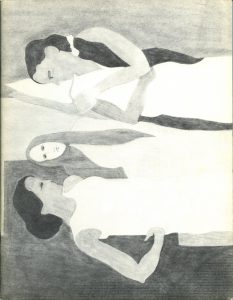if you chose to come near
when the moon was full as a new quarter is round
you would find him out with his rifle
or with his old double-barrel 12-gauge rabbit-ears shotgun
blasting away into the pinlights in the sky
but even if you chose to stay away
you could listen and tell the gun he was using
by the way it zinged into the usual white-green darkness
the rifle was piercing
like the long shrill of a horseshoe hitting with full force around an iron peg
the shotgun rumbled like long ringing thunder
years after years he flung his mysterious tunes into the night
one night the moon came as full as ever without his humming cracks
folks worried terribly
when midnight came and his pipes had not echoed through the trees
the night was so smooth they could have slipped through leaves
like sweet winds or even silk sliding from young breasts
they stayed away
they worried terribly
in all the county
and in the taverns (where usually voices overflowed the walls)
lips turned to low whispers
they waited
for his nephew who was his only living kin
“that crazy old uncle of mine” he wailed
“didn’t shoot up into the moon last night
he thinks the lord lives there
you know
he said it was some earth men up there
he had no feudings with”
George Mosby, Jr.’s work appeared in phoebe multiple times in the 70s, 80s, and 90s. Unfortunately, little biographical information on George is found in these issues. From our 1979, 8.2 issue, we see that in addition to phoebe his work appeared in Images, Hanging Loose, The Unicorn, Northwoods Journal, and Vega. In 1978, he won 3rd place in the Wayside Quarterly Poetry Award.
In 1990, phoebe reached out to Mosby’s wife, Judith Ann Mosby. Her response to this request was published in our 20.1&2 issue from 1990. Among other details, she wrote that Mosby was born in 1950. At the age of three, his father, a Korean War veteran, was found hanged in an apple tree in their yard. It is not known whether it was a murder or suicide.
Mosby grew up in poverty, and spent time in the James River Correctional Center where he married Judith Ann in 1982. The following year, upon his parole, they had a daughter.
She closes the letter with this:
“George rests in the backyard of his grandparents, beside his grandmother’s grave. He died of what the medical examiner called an accidental overdose of diphenhydramine, a cough syrup. He was alone at the time of his death and his family is left with doubts as to whether it was an accident, a suicide or a murder.”
Earlier in the letter Judith Ann wrote that, “The poems will have to speak for themselves. I believe there is an underlying concern in George’s work to return to a more peaceful time than the one that surrounded him as an adult.”
